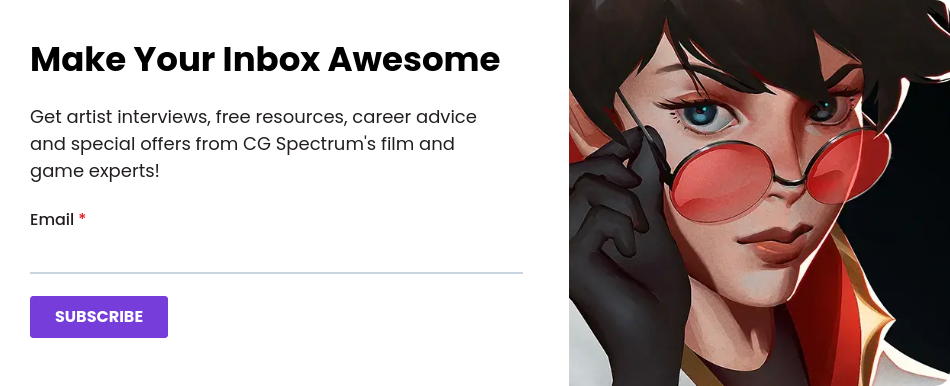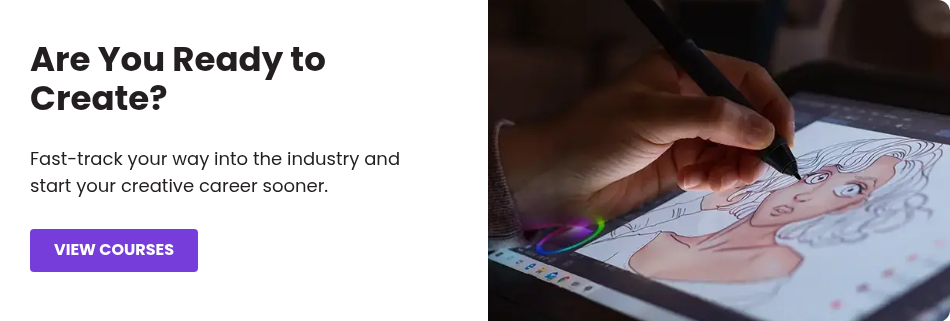The expansion and evolution of the film and games industry over the twenty-first century has increased the legitimacy of a creative career. Once considered a non-traditional career path, the role of the ‘digital artist’ continues to move towards the mainstream, along with the democratization of technology. This raises an important question for emerging artists: do you need a formal education to work or advance in the creative industries?
While the journey into film and games might not always demand a formal education, there are significant benefits to studying at an institution dedicated to creative technology. We delve into why a formal education can contribute to your success in the industry.
Build Routine and Structure
Studying at a reputable school instills good work habits. Scheduled classes and assignments bring about structure and routine, which can cultivate a strong work ethic, build vital interpersonal skills like time management and organization, and offer a framework for creating consistent and quality art.
Consistency is key to becoming a good artist. It will help you produce better quality work (and, often, more of it!) while ensuring you can adhere to deadlines — something film and games studios enforce on almost every project.
As an online film and games education provider, CGS not only provides you with a structured routine but also offers you the flexibility to work from home, allowing you to better balance your other commitments.
Gain a Multidisciplinary Skillset
Creativity, while vital, is not the only skill required in the creative industries. To succeed in film and games, along with creative and technical aptitude, you must learn how to sharpen your critical thinking and problem-solving abilities, which will help you adapt and evolve within a highly dynamic workplace.
The good news is skills like critical thinking can be learned and honed with proper training, and formal education is a great way to develop them.
CGS’s career tracks and accredited courses, developed by industry professionals and academics, provide you with a comprehensive education, including how to think critically and problem-solve. The career tracks teach this through industry insights provided by the mentors and the degrees and diplomas include this in the curriculum through four unique learning tracks to ensure all required skills are mastered.
Accredited courses four learning streams:
- Creative Concepts and Principles: Learn the history of the industry and relevant theory;
- Industry Concepts, Processes, and Capabilities: Focus on interpersonal skills and business acumen;
- Technical and Creative Processes and Practices: Build practical skills and techniques using industry tools;
- Capstone Trimester: Spend time developing a high-quality professional portfolio along with essential job skills. The career track courses also dedicate a term to this.
Networking and Exposure
Formal education, whether online or in a physical building, places you within a vibrant ecosystem of creative peers, industry professionals, and academics with whom you can forge meaningful and valuable connections.
Through these connections, you become privy to opportunities you might not find outside your studies, such as gaining industry insights and inspiration from your creative instructors, engaging in discussions with your classmates that spark creativity and new ways of thinking, and collaborating with the wider community on projects that can help shape your creative trajectory.
When you enroll at CG Spectrum, you gain lifetime access to our unique online community, comprised of over 4,000 students, graduates, and mentors. It's the perfect space to push your learning further, share your progress, find other artists to collaborate with, seek valuable support and advice, and network and make friends.

The community also hosts regular creative challenges and collaborative group activities, creating opportunities to participate in cross-disciplinary projects and refine your newly learned skills. Troubleshooting any technical problems is made easier with the help of dedicated online Technical Assistants located across the globe to ensure you can keep moving forward with your learning and your art.
CGS also partners with world-class studios to ensure you build connections that count, allowing you direct access to the industry and ensuring we keep our finger on the pulse of creative and technological trends and industry needs.
Shape a Strong Professional Portfolio
A strong portfolio is essential to break into or move up in film and games. It not only illustrates your style, range, and ability, it also demonstrates your commitment to your craft and your understanding of industry standards and trends.
A quality creative course will ensure you dedicate time to your portfolio development with guidance, support and feedback from professional digital artists, allowing you to refine your art — to emphasize your strengths and uniqueness and address any weaknesses. An essential part of growing as an artist is being able to receive constructive criticism of your work, and creating your portfolio is a practical way to get used to this process.
The creative industries are not just about creating; they are about understanding the market, meeting client expectations, and navigating the intricacies of project management. A formal education merges creativity with practicality, providing you with insights into industry trends, technological advancements, and client dynamics. Armed with this knowledge, you graduate not only as a creative but also as a strategic thinker ready to tackle real-world challenges.
CG Spectrum's bachelor's degrees and career tracks ensure students dedicate to building a high-quality portfolio that showcases their professional, artistic, and technical abilities—a crucial stepping stone in your journey toward a successful career in the competitive world of film and games.
While working on your professional portfolio, you'll also learn practical job skills from experts who've worked in the industry, so you're ready to hit the ground running when you graduate.
Stand Out from the Competition
Imagine a recruiter has two equally impressive entry-level portfolios in front of them. The only real difference is that one of the applicants has graduated from a reputable institution, and the other doesn't. Who is more likely to get the job?
The creative job market is undeniably competitive, and a formal education can be what distinguishes you from other digital artists. If you graduated from a respected and recognized institution, that institution’s credibility gets passed on to you.
Completing a course also signifies your commitment, discipline, and ability to persevere through a structured curriculum. Employers often view study as a seal of approval, showcasing your dedication to your chosen field and your willingness to undergo rigorous training, honing your craft under the guidance of seasoned professionals.
A formal education serves as proof of your qualifications and expertise, which not only increases your chances of obtaining a visa but also makes you a more attractive candidate to potential employers.
Conclusion
While the question of whether you need a formal education to excel in the film and games industry is not definitive and depends largely on each individual, the advantages of pursuing a creative course are still abundantly clear.
A formal education can instill structure and a strong work ethic, help you build your expertise beyond your natural skillset, assemble a network of valuable connections, enhance your portfolio, impart industry insights, increase your employability, and lend credibility to your name.
It's important to note that, unlike some industries — like law or medicine — a formal education is not necessary to enter the industry, and some artists have forged successful careers through alternative paths.
Study at CG Spectrum and experience the benefits of a formal education for your creative career!
Whether you want to work in film or games, our industry-led and career-focused courses will help you master your specialization while building a well-rounded skillset that includes relevant technical, creative, theoretical, and practical skills. These skills will not only set you up for success in the creative industries but can help you stand out from the competition.

Related Links
- Game development career pathways
- Game design courses
- Game programming courses
- Expert Panel: The Future of Games




